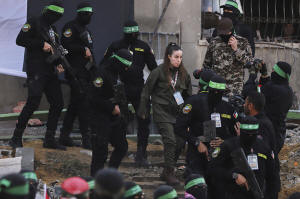After the initial ecstasy of freedom, released hostages face a long road
to recovery
 Send a link to a friend
Send a link to a friend
 [January 31, 2025]
By MELANIE LIDMAN [January 31, 2025]
By MELANIE LIDMAN
TEL AVIV, Israel (AP) — When Ilana Gritzewsky returned to Israel after
being held captive in Gaza for 55 days in November 2023, she had so much
adrenaline coursing through her body she couldn’t sleep for two days.
“You don’t understand that it’s really over," Gritzewsky recalled. "You
don’t know who you are or even what your name is.”
A ceasefire between Israel and Hamas is underway and hostages are being
released in stages. But after the initial jubilation of being freed, the
released captives — who have been held for more than 15 months — are
likely to endure a trying reentry, based on the testimony of those who
were held hostage themselves.
Gritzewsky, 31, who is originally from Mexico, was kidnapped with her
boyfriend from Kibbutz Nir Oz on Oct. 7, 2023, when Hamas-led militants
burst across the border, killing around 1,200 people, and kidnapping
around 250 people, in an attack that sparked the war in Gaza.
Gritzewsky was released after 55 days during the only previous ceasefire
deal a year ago.
More than a year later, Gritzewsky has lingering health issues. She
hasn’t regained all of the weight that she lost, she’s prediabetic, and
has lingering pain issues from the kidnapping, when her pelvis and jaw
were broken and her leg was burned from the motorcycle exhaust. She
suffered hearing loss in one ear.

“I’m still not able to really take care of myself,” she said. “I don’t
think my brain has really grasped everything I’ve gone through.”
She’s acknowledges she has neglected her own recovery as she advocates
tirelessly for her boyfriend’s release.
Fifteen hostages have been released from Gaza, in exchange for hundreds
of Palestinian prisoners and detainees, as the current ceasefire for the
war that has devastated Gaza moves into its second full week. More than
47,000 Palestinians have been killed in Gaza and wide swaths of the
territory have been destroyed. Hamas is expected to release small groups
weekly throughout the ceasefire's initial six-week phase. There are
approximately 80 hostages left in Gaza, almost half of whom Israel
believes to be dead.
The joy of a warm embrace, and a new reality sets in
When Gritzewsky was freed, she was able to do what she had dreamed of
during her captivity: hug her mother and see her family.
She was desperate for a good steak, but due to concerns about health
complications spurred by eating too much or too quickly in those with
prolonged vitamin and nutritional deficiencies, it took time before she
could eat what she wanted.
“You’re used to hostage conditions, so whenever you get food you put
some to the side. You ask if you can go to the bathroom, if you can
sleep,” she said.
The leadup to her release was traumatic. Gritzewsky said she was told
four times she was being released, only to be brought to a different
location. Each time her transfer didn’t lead to freedom.
“I thought this was going to be my life forever, that I was going to be
a doll for Hamas terrorists, I’d end up having babies with them, I
wanted to just smash my head into the wall and die,” she said.
Watching the released hostages enter Israel over the past week was a
“storm of emotions,” said Gritzewsky.
“It’s finally starting. Our heroes are starting to come out, and they’re
leaving on their own two feet,” she said. But there’s also uncertainty
about whether the ceasefire will hold. Gritzewsky’s boyfriend, Matan
Zangauker, 25, is not on the list of 33 hostages expected to be released
in the first stage of the ceasefire.

[to top of second column]
|

Israeli soldier Agam Berger walks next to masked Islamic Jihad
militants as she is handed over to the Red Cross at the Jabalya
refugee camp in Gaza City, Thursday Jan. 30, 2025.(AP Photo/Mohammed
Hajjar)

Hostages must adjust to regaining their autonomy
The hostages stay in the hospital for several days as they undergo a
battery of tests to determine next steps. All 15 of the hostages
released over the past two weeks returned in stable condition but
were suffering from “mild starvation” and vitamin deficiencies,
according to Dr. Ami Banov, an Israeli military doctor who has
treated the released hostages. He said many of them suffered
injuries in the Oct. 7, 2023, Hamas attack and that the medical care
they received was nonexistent or poor quality. Many of them still
have pieces of shrapnel in their body.
Some of the women who have returned recently said they were held in
tunnels and deprived of sunlight for at least eight months straight,
said Banov, which can lead to major vision or skin issues. Those who
were held in captivity with others seem to be faring better mentally
than hostages who were kept alone, he said.
Each hostage is accompanied by a dedicated team of doctors, nurses,
specialists, psychologists, and social workers, medical officials
said.
One of the most important things is allowing the returned hostage to
lead the recovery, explained Ofrit Shapira, a psychoanalyst who
heads a group of health professionals treating freed hostages, their
families, and survivors of the Oct. 7 attack. Everyone treating them
must ask their permission for each little thing, from turning off a
light to changing bedsheets to carrying out medical tests.
“They took everything away that defines them as humans, especially
privacy and autonomy, and it’s a challenge to help them regain
that,” she said.
Doctors refer to this process as “grounding” said Banov, who likened
it to a decompression process, gradually helping the hostages
understand they have regained control over such decisions as what to
eat, what to wear and where and when to meet their families.
“We feel obligated to give them the option to do whatever they feel
right,” he said. But he said everything is being done in “very small
steps.”
Adina Moshe was freed after 49 days in captivity. In a first-person
account on the Israeli news site N12, she said some hostages will
return knowing little about any destruction to their homes or the
fates of their loved ones. They will remain suspicious of people and
have to contend with aggressive media. Any improvement in their
condition can easily reverse, she said.
“In their souls, they will continue to remain in the tunnels for a
long time,” she wrote.

It will take a long time to ‘repair wounds of the soul’
Avichai Brodutch, whose wife and three children were kidnapped on
Oct. 7 from Kibbutz Kfar Aza will never forget waiting for them to
return in the hospital and the moment he saw them for the first
time.
“The elevator doors opened and I got my family, reborn,” he said.
Brodutch said the return was both overwhelming and joyful because he
feared his family had been killed during Hamas' initial attack. He
said they returned thin and lice-ridden.
The physical issues were quickly treated. But Brodutch said
captivity left a lasting imprint on his family's mental well-being.
Each day, he hears a new story about something that happened in
Gaza. They relive Oct. 7 over and over, and the challenges remain
largest for his wife, Hagar, who cared for their three children and
a neighbor's child, Abigail Edan, then 3, while in captivity.
"It’s going to take a long time to repair the wounds of the soul,”
he said.
All contents © copyright 2025 Associated Press. All rights reserved |